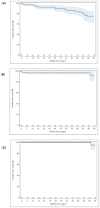Prognostic impact of small size sutureless prostheses: results for 241 patients from an international registry
- PMID: 40713846
- PMCID: PMC12291506
- DOI: 10.1186/s13019-025-03558-9
Prognostic impact of small size sutureless prostheses: results for 241 patients from an international registry
Abstract
Background: The treatment of aortic valve disease in small annuli remains a debated topic in terms of prosthetic choice - biological or mechanical - and risk of patient prosthesis mismatch.
Methods: The clinical data of the 241 patients who received a small size sutureless prosthesis from the Sorin Universal REgistry on Aortic Valve Replacement (SURE-AVR) (NCT02679404) were analysed at 30 days and at follow-up. The mean age was 75.5 ± 7.8 years (89.2% female); the mean Society of Thoracic Surgeons (STS) score was 4.2 ± 3.2%, and the preoperative NYHA class II or III score was 83.8%. A minimally invasive approach was performed in 52.7% of patients; concomitant procedures were performed in 27.8% of patients. Similar aortic clamping and cardiopulmonary bypass times were observed in the overall isolated cohort and the isolated minimally invasive cohort. The mean intensive care unit (ICU) stay was 2.4 ± 2.0 days and the total length of stay was 10.3 ± 6.1 days.
Results: Three deaths were recorded at 30 days (1.2%), 2 for noncardiac causes. One patient experienced a myocardial infarction (0.4%) and 2 a nondisabling stroke (0.8%). 2 patients showed intraprosthetic leakage ≥ 2 and one patient para-prosthetic leakage ≥ 2; of these, one patient required reoperation with prosthesis removal. 4.1% of patients required a pacemaker implant. At a maximum follow-up of 8.1 years, 10 cardiovascular deaths, 4 valve related reinterventions (3 structural valve deterioration (SVD) requiring TAVI Valve-in-Valve, 1 endocarditis) occurred.
Conclusions: With their good clinical outcomes, sutureless prostheses represent a good alternative for patients with small annuli, who are at high risk for annular enlargement and anticoagulant therapy.
Trial registration: Study number 587/2015.
Keywords: Biological heart prosthesis; Follow-up outcome; Patient‒prosthesis mismatch; Sutureless aortic valve.
© 2025. The Author(s).
Conflict of interest statement
Declarations. Ethics approval and consent to participate: Comitato Etico Sperimentazione Clinica Ceavno (Area Vasta Nord-Ovest Toscana). Reference number: Study N° 587/2015. All patients provided written informed consent to participate. Consent for publication: All authors have read and approved the final manuscript and consent to its publication in The Journal of Cardiothoracic Surgery. Competing interests: The authors declare no competing interests. Disclosure of relationships and activities: Angelo Lucas Nobre, Patrick Gene Parrino, Max Baghai, Giovanni Troise, George Asimakopoulos, Basel Ramlawi and Mattia Glauber are consultants for CORCYM. Disclaimers: The statements, opinions and data contained in the publication are solely those of the individual author(s) and contributor(s) and not an official position of the institution or funder.
Figures
References
-
- Pibarot P, Dumesnil JG, Cartier PC, Metras J, Lemieux MD. Patient-pros-thesis mismatch can be predicted at the time of operation. Ann Thorac Surg 2001; 71:S265–8. - PubMed
-
- Kato Y, Hattori K, Motoki M, et al. Optimal results of aortic valve replacement with small mechanical valves (< 19 mm). J Heart Valve Dis. 2013;22:468–75. - PubMed
-
- Roedler S, Czerny M, Neuhauser J, et al. Mechanical aortic valve prostheses in the small aortic root: top hat versus standard carbomedics aortic valve. Ann Thorac Surg. 2008;86:64–70. - PubMed
-
- Mohty D, Malouf JF, Girard SE, et al. Impact of prosthesis- patient mismatch on long-term survival in patients with small St Jude medical mechanical prostheses in the aortic position. Circulation. 2006;113:420–6. - PubMed
Publication types
MeSH terms
LinkOut - more resources
Full Text Sources


